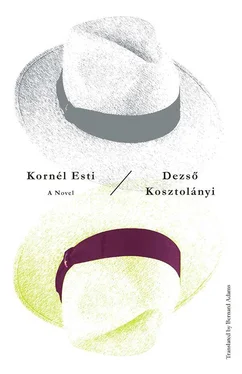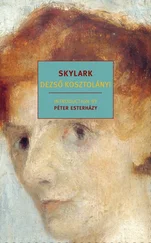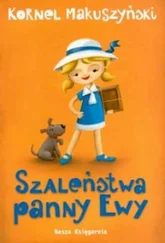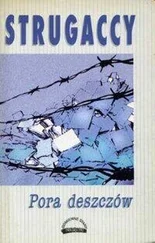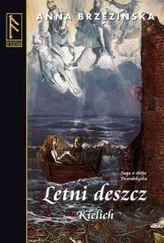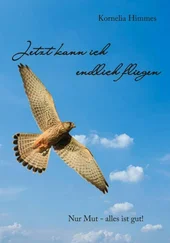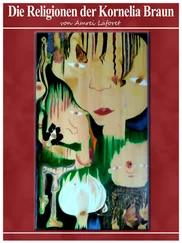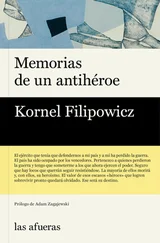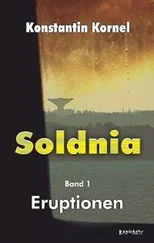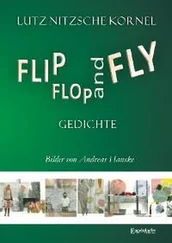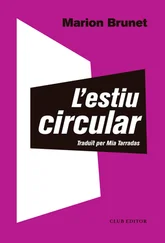Flabbergasted, I stared at these nightmare figures, who had certainly — either in my imagination or in real life — at one time lived and breathed, but were now black and dead and cold, like glowing embers after they’ve cooled, died down, and crumbled to ash. I didn’t know them. They, however, knew me and recognized me. Some I told to go and see Kornél. At that they smiled. Asked for a personal description of him. And at that they derisively pointed at me. They asked for his address. There I couldn’t really help them. My friend was most of the time traveling abroad, sleeping on aircraft, stopping here and there for a day or two, and to the best of my knowledge had never yet registered with the police. Kornél Esti certainly existed, but he was not a legal entity. So however innocent I knew myself to be of all these terrible crimes, the case against me didn’t look good. For Kornél’s sake I didn’t expose myself to the unpleasantness of confrontation. I had to take upon myself all his debts, his tricks, his dishonesty, as if I were responsible for them all.
I paid. Paid a lot. Not only money. I paid with my reputation too. People everywhere looked at me askance. They didn’t know where they were with me, whether I was right or left off center, whether I was a patriotic citizen or a dangerous rabble-rouser, a respectable family man or a depraved voluptuary, and altogether whether I was a real person or just a dream figure — a drunken, double-dealing, lunatic scarecrow who still flapped his ragged, cast-off gentleman’s coat whichever way the wind blew. I paid dearly for our friendship.
All that, however, I instantly forgot and forgave on that windy spring day when I decided to call on him.
That was a mad day. Not the first of April, but not far off. A mad, excited day. In the morning there was a frost, with mirrors of ice crackling on the iron gratings round the trees and the sky a bright blue. Then a thaw set in. Water dripped from the eaves. Mist spread over the hills. A lukewarm drizzle fell. The earth steamed like an overdriven, sweating horse. We had to throw off our winter coats. A rainbow hung its gaudy arc above the Danube. In the afternoon hail fell. It frosted the trees and squashed into slush beneath our feet. The wind whistled. Whistled keenly. Whistled up on high, round the chimneys, on the roofs of houses, in the telephone wires — everything was in motion. Houses groaned, attics creaked, beams sighed, wanting to put out buds, because they too had been trees. In that starting, that revolution, in came spring.
I listened to the whistling of the wind and remembered Kornél. I felt an irresistible desire to see him as soon as I could.
I telephoned here and there, to coffeehouses, nightclubs. By late evening all that I had been able to discover was that he was in Hungary. I tracked him on foot and in the car. At two in the morning I learned that he was staying at the Denevér Hotel. By the time I reached it a Russian blizzard was raging around me, and the collar of my raincoat was filled with its frothy flakes.
The porter at the Denevér directed me to room 7 on the fifth floor. I climbed a narrow spiral staircase, as there was no elevator. The door of room 7 was ajar. Inside the light was on. I went in.
I saw an empty bed, the blankets thrown back in a heap, and a feeble electric light on the nightstand. I thought that he’d popped out somewhere. I sat down on the sofa to wait for him.
But then I noticed that he was there, opposite me, sitting in front of the mirror. I jumped up. He did too.
“Hello,” I said.
“Hello,” said he immediately, as if he wanted to pick up just where we had left off.
He wasn’t at all surprised at my bursting in so late. He wasn’t surprised at anything. He didn’t even ask what I wanted.
“How are you?” he asked.
“Very well, thank you. And you?”
“Likewise,” he replied.
He stared at me and laughed.
He was wearing a raincoat. There was snow on his collar too.
“Just got in?”
“Yes,” he nodded.
I looked round the room. It was a dingy hole. A narrow, dilapidated sofa, two chairs, a cupboard, a five-day-old newspaper on the table, a bunch of wilting violets. A mask, too, goodness knows what for. Cigarette butts on the floor, yellow spectacles and quince jelly in the violin case, open suitcases. A few books, mostly timetables. No pen or paper to be seen. Where he worked was a mystery.
My father had been right. He hadn’t amounted to anything. Here there was nothing but the poverty of a hermit, the liberty and independence of a beggar. I had wanted that sort of thing at one time. My eyes filled with tears.
“What’s new?” he inquired.
Outside the wind was howling. The cutting spring wind whistled shrilly. A siren too was wailing.
“Ambulance,” he said.
We went to the window. The blizzard had stopped. The sky shone crystal clear, as did the frosty roadway. The ambulance siren shrieked in competition with the spring wind.
Scarcely had it passed when a fire engine roared past to somewhere, its light flashing.
“Accidents,” I said. “All day long bricks have been falling, shop-signs crashing down on the heads of passersby. People have been slipping and falling on the icy sidewalks, hurting their hands, spraining their ankles, bleeding. Houses and factories have been catching fire. All sorts of things have been happening today. Frost, heat, mist, sunshine, rain, rainbow, snow, blood, and fire. It’s spring.”
We sat down and lit cigarettes.
“Kornél,” I broke the silence, “aren’t you angry?”
“Me?” and he shrugged. “Idiot! I can never be angry with you.”
“But you’d have good reason. Look, I was angry with you. I was embarrassed by you in front of people that mattered, I’ve had to get on, I’ve denied you. Haven’t even looked in your direction for ten years. But this afternoon, when the wind whistled, I thought of you and felt remorse. I’m not young any more. I turned forty last week. When you’re not young, you mellow and you can forgive everything. Even youth. Let’s make up.”
I stretched out a hand.
“Oh, you haven’t changed,” he scoffed. “Always so sentimental.”
“But you have, Kornél. When we were children you were the grownup, you were the leader, you opened my eyes. Now you’re the child.”
“Aren’t they both the same?”
“That’s what I like about you. That’s why I’ve come back, and now I’m going to put up with you forever.”
“What’s the matter with you today, that you’re saying such nice things about me?”
“Well, who else am I to say nice things about, Kornél? Who is there but you that I could love and not feel jealous of? Whom can I admire in this round world if not you, my brother and my opposite? Identical in everything and different in everything. I’ve gathered, you’ve thrown away, I’ve gotten married, you’ve stayed a bachelor, I worship my people, my language, I can only live and breathe here in Hungary, but you travel the world, fly above nations, in freedom, shrieking ever lasting revolt. I need you. I’m empty and bored without you. Help me, otherwise I’ll die.”
“I could do with somebody as well,” he said, “a pillar, a handrail, because look, I’m going to pieces,” and he gestured at the room.
“Let’s stick together,” I suggested. “Let’s make a deal.”
“To do what?”
“Let’s write something, together.”
He opened his eyes wide. Spat his cigarette onto the floor.
“I can’t write anymore,” he said.
“But it’s all I can do,” I said.
“Oh really,” he replied, and gave me a hard look.
“Don’t misunderstand me, Kornél. I’m not showing of, only complaining, like you. Make me whole again, like you used to. In those days, when I was asleep you were awake, when I cried you laughed. Help me now too — remember the things I forget, and forget what I remember. I’m worth something as well. Everything I know will be at your disposal. I’ve got a home, everything there helps my work, and it will help yours too. I work hard, I’m devout and loyal. So loyal that I can’t upset anyone with whom I’ve exchanged a single word, not even in my mind. I’m so loyal, Kornél, that because of my old dog I won’t even pet other dogs, or play with them, or even look at them. Even to inanimate objects — sometimes I ignore my fifteen excellent fountain pens and bring out a worn-out, scratchy pen which it’s torture to write with, and scratch away so as to cheer it up, poor thing, and prevent it from feeling unwanted. I’m loyalty incarnate. You’ll be disloyalty, instability, at my side. Let’s start a business partnership. What can a poet achieve without anyone? What can anyone achieve without a poet? Let’s be joint authors. One man isn’t enough to write and live at the same time. Those who’ve tried it have all broken down sooner or later. Only Goethe could do it, that calm, cheerful immortal; when I think of him a shiver runs down my spine, because there’s never been a cleverer and more fearsome man, that splendid, Olympian monster, beside whom even Mephistopheles is a worthless snob. Yes, he forgave and saved Margaret, whom the earthly judges had imprisoned, and took the mother who had killed her child to heaven among the archangels and learned men of the faith, and made hidden choirs sing his eternal defense of womanhood and motherhood. A few years later, though, when he sat as a magistrate in Weimar and had to pass judgment on a similar infanticide mother, Margaret’s former champion condemned the girl to death without batting an eyelid.”
Читать дальше
